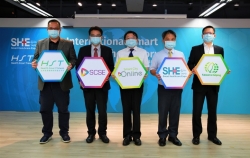TAIPEI — While the spreading of COVID-19 pandemic has put unprecedented impact on the healthcare system all over the world, the application of AIoT (Artificial Intelligence + Internet of Things) brought in a breath of fresh air in the field. For example, in Taiwan, wearable devices are deployed to obtain isolated or infected individuals’ physical data during treatment with no contact and the data could be used for further medication. A 1-second AI pneumonia detection system is used for diagnosis within a short time. This Taiwanese solution has drawn worldwide attention on the website of World Healthcare Organization (WHO).
Before the kickoff of Smartcity online in July, there are warm-up events under the theme of “pandemic prevention” in June and July. Taipei Computer Association (TCA) and Joint Commission of Taiwan (JCT) jointly held the first session of International Smart Healthcare Forum last week and the second session on June 17th named “Pandemic Fighters: Deployment of AIoT Turnkey Solutions”. The event was hosted by Dr. Wui-Chiang Lee, Director of Department of Medical Affairs and Planning, Taipei Veterans General Hospital. The speakers included Dr. Hou-Chaung Chen, Deputy Superintendent of Tao yuan Tao-Yuan General Hospital, Dr. Ping-Yen Liu, Director of National Cheng Kung University Hospital, Mr. Andy Lu, Smart Health Director of ASUS Cloud, and Mr. Jason Miao, Business Development Manager of iMedtac. The two sessions each involved more than thirty overseas medical staff as online audience. The next session, the 3rd edition of Smart Hospital Leadership Summit, is scheduled to be held on July 3rd.
Dr. Wui-Chiang Lee pointed out that the SARS experience from 17 years ago has prepared Taiwan well for the COVID-19 pandemic. Taiwan’s healthcare system has been refined carefully no matter in terms of the resources allocation or strategies for hospital-acquired infection control. Most importantly, with advanced technologies, the wearable IoT devices like smartwatches or wristband help authorities to track self-isolated targets more precisely and easily, as citizens are well self-disciplined by wearing masks and wash hands regularly. All these are main reasons why the pandemic in Taiwan could be contained.
Dr. Hou-Chaung Chen, Deputy Superintendent of Tao yuan Tao-Yuan General Hospital said that Tao-Yuan General Hospital, neighboring to the Taoyuan International Airport, has accommodated 59 infected cases as of mid-June, becoming the front-line hospital of the nation. At the time when the hospital was aware of the irreversible situation of the pandemic, they immediately contacted ASUS and FET in January to prepare for the application of wearable measurement system with IoT solution. Within just a month, they successfully introduced smartwatch into the hospital for the medical staff to monitor real-time physical data of isolated or infected targets. The solution not only decreased the health risks for frontline workers, but uploaded all data onto the hospital’s pandemic control platform for clearer and smarter decision-making.
Dr. Ping-Yen Liu, Director of Clinical Medicine Research Center, National Cheng Kung University Hospital (NCKUH), also claimed that the application of AIoT technology really is the biggest help for Taiwan to win the war against the virus. From the beginning of the outbreak, NCKUH worked with the Robotics Laboratory of National Cheng Kung University on the smart clinical voice service system as well as the implementation of AI test and diagnosis system for COVID-19. They were also keen to establish standard process for diagnosis and isolation treatment. In this way, medical staff could be able to provide service smoothly under the SOPs with lower mental pressure. Meanwhile, the effectiveness of their AI pneumonia detection system has been recognized by WHO, which shared Taiwan’s prevention experience using AI technology with world.
Mr. Jason Miao, Business Development Manager of iMedtac stated that AIoT technology really plays a key role in Taiwan’s fighting against the pandemic. He believed that it should be an inevitable trend to develop long-distance physical tests and diagnosis services. The virus may slow down people’s mobility, but not the progress of telemedicine, which is turning to be part of common healthcare service under the advancing telecommunication technologies and applications.
(picture 1) Due to the outbreak of the pandemic, the International Smart Healthcare Forum of 2020 Smart Healthcare Expo (SHE) changed into an online event. The second session was held on June 17th, involving over 180 registered audiences.
(picture 2) The panel discussion focuses on the role of AIoT in the pandemic prevention. From left to right seated Dr. Wui-Chiang Lee, Director of Department of Medical Affairs and Planning, Taipei Veterans General Hospital, Dr. Ping-Yen Liu, Director of National Cheng Kung University Hospital, Dr. Hou-Chaung Chen, Deputy Superintendent of Tao yuan Tao-Yuan General Hospital, Mr. Andy Lu, Smart Health Director of ASUS Cloud, and Mr. Jason Miao, Business Development Manager of iMedtac.
The recap video of the Forum: https://www.youtube.com/watch?v=E9uNRQaaT5M
